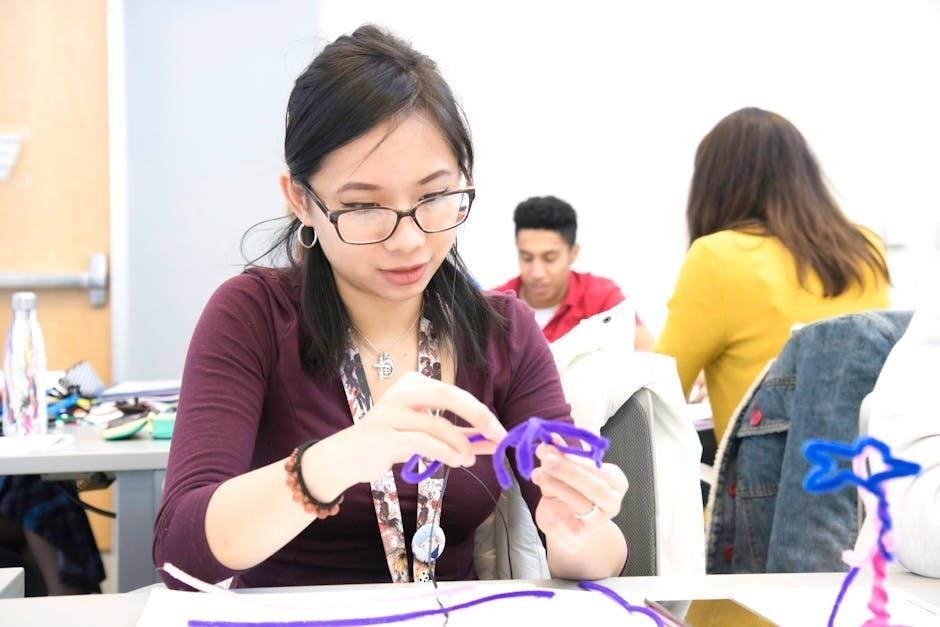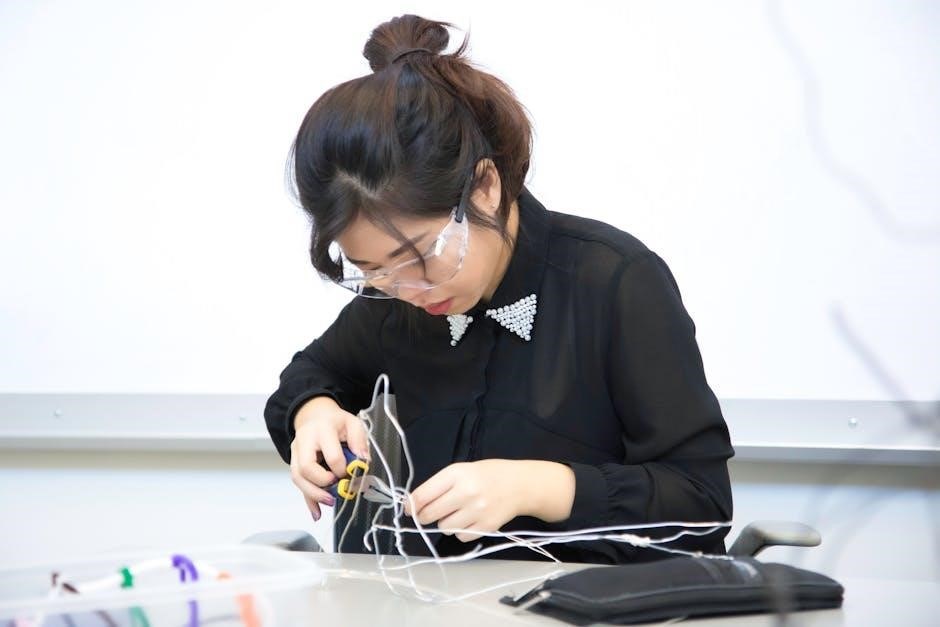The TCOP Student Manual serves as a comprehensive guide, outlining academic policies, support services, and professional development opportunities. It helps students navigate their program effectively, ensuring success and preparedness for future endeavors.
1.1 Overview of the Manual’s Purpose and Structure
The TCOP Student Manual is structured to provide clear guidance, ensuring students understand program expectations and resources. It is divided into sections covering academics, support services, assessments, and professional development. Each section offers detailed information to help students navigate their journey effectively, promoting academic success and professional growth. The manual is designed to be user-friendly, with accessible instructions and resources.
1.2 Importance of the Manual for Student Success
The TCOP Student Manual is essential for guiding students through academic expectations, policies, and professional standards. It provides clarity on program structure, support services, and resource utilization, ensuring students are well-prepared for their academic and professional journey. The manual fosters independence, accountability, and success, serving as a critical tool for navigating the pharmacy program effectively.

Academic Policies and Expectations
The TCOP program outlines clear academic policies and expectations to ensure students meet professional standards and academic obligations effectively.
2.1 Program Details and Curriculum Overview
The TCOP curriculum is structured to develop essential skills for pharmacy practice, blending theoretical knowledge with practical training. It includes foundational sciences, clinical applications, and experiential learning opportunities. The program is divided into phases, each building on previous knowledge to ensure comprehensive understanding and readiness for professional responsibilities.
2.2 Academic Integrity and Plagiarism Policies
The TCOP program emphasizes academic integrity, requiring students to submit original work. Plagiarism is strictly prohibited, with consequences for violations. Proper citation and ethical practices are mandatory. The college utilizes tools like Turnitin to ensure compliance. Students are encouraged to understand and adhere to these policies to maintain academic honesty and uphold professional standards throughout their studies.
Support Services for Students
The college offers academic advising, career counseling, and mental health support. Resources include tutoring, wellness programs, and student organizations to foster academic and personal growth.
3.1 Academic Advising and Career Counseling
The TCOP Student Manual emphasizes the importance of academic advising and career counseling. Academic advisors guide students in course selection and career alignment, while career services provide job search strategies and networking opportunities. These resources help students navigate their academic journey and prepare for professional success, ensuring they are well-equipped for the pharmacy field.
3.2 Mental Health and Wellness Resources
The TCOP Student Manual emphasizes the importance of mental health and wellness, offering counseling services, stress management workshops, and peer support groups. These resources help students manage academic pressures and maintain a healthy work-life balance, contributing to their overall success in the program. Utilizing these services is encouraged to ensure well-being and thrive academically.

Assessment and Evaluation Methods
The TCOP program uses a variety of assessment methods, including exams, quizzes, and practical evaluations, to ensure students meet learning objectives and stay on track for success.
4.1 Examination Policies and Procedures
The TCOP Student Manual outlines clear examination policies, emphasizing proper preparation, punctual attendance, and adherence to procedural guidelines. Students are encouraged to utilize online resources through the student portal for access to digital study materials and exam schedules, ensuring they are well-prepared and informed about expectations and deadlines.
4.2 Remediation Strategies for Underperforming Students
TCOP offers tailored remediation strategies to support underperforming students, including additional tutoring, targeted study materials, and regular progress assessments. Students are encouraged to utilize online resources like Quizlet for memorization and seek academic advising early to address challenges. Proactive engagement with these tools ensures timely intervention and helps students achieve their academic goals effectively.

Student Engagement and Professional Development
TCOP fosters student engagement through extracurricular activities, organizations, and interprofessional learning, promoting collaboration and skill development. These opportunities enhance professional growth and prepare students for real-world challenges.
5.1 Extracurricular Activities and Student Organizations
TCOP offers a variety of student organizations and extracurricular activities to enhance learning and personal growth. These opportunities provide leadership development, networking, and skill-building experiences. Students can engage in community service, professional societies, and cultural events, fostering a well-rounded education and preparing them for future professional roles.
5.2 Interprofessional Education and Collaborative Learning
Interprofessional education (IPE) is a cornerstone of the TCOP curriculum, fostering collaboration among students from diverse healthcare disciplines. Through case studies, simulations, and team-based activities, students develop essential communication and teamwork skills. These experiences mirror real-world healthcare settings, preparing students to work effectively in multidisciplinary teams and enhance patient care outcomes.

Utilization of Online Resources
Access digital textbooks, study materials, and library resources through the student portal. Effective use of these tools enhances academic success and streamlines learning experiences.
6;1 Accessing Digital Textbooks and Study Materials
Students can access digital textbooks and study materials through the student portal. These resources are available online, offering unlimited access to required and recommended texts. Utilize platforms like Quizlet for flashcards and practice tests to enhance learning. Printed solution manuals are also available, providing accurate solutions authored by textbook writers. Proper documentation and organization of materials ensure academic success and compliance with policies.
6.2 Effective Use of the Student Portal and Library Resources
The student portal is a central hub for accessing library resources, digital textbooks, and study materials. Students can navigate through the portal to explore various tools and databases. Utilize library resources effectively by organizing your study materials and documenting sources properly. The portal also offers guides and tutorials to help students maximize their academic productivity and make the most of available resources.
Tips for Mastering the Material
Mastering the material requires effective study techniques and time management. Utilize tools like Quizlet for memorization and practice tests to reinforce learning and retention strategies.
7.1 Study Techniques and Time Management Strategies
Effective study techniques include active learning, spaced repetition, and practice testing. Prioritize tasks, set realistic goals, and allocate time wisely. Use digital tools like calendars and Quizlet to stay organized and reinforce learning. Regular review of notes and materials ensures long-term retention and academic success. Balancing study with breaks maintains productivity and mental well-being.
7.2 Leveraging Flashcards and Quizlet for Memorization
Flashcards and Quizlet are powerful tools for memorization. Create flashcards for key terms and concepts, and use Quizlet’s study modes, tests, and games to reinforce learning. Regularly review and track progress to identify areas needing attention. This method complements traditional study techniques, enhancing retention and understanding of complex material. Consistent use ensures mastery of vital pharmacy concepts.
Navigating the Pharmacy Program
This section provides guidance on navigating the pharmacy program, including IPPE opportunities and experiential learning. It prepares students for assessments like PCOA and other evaluations essential for success.
8.1 IPPE and Experiential Learning Opportunities
The Introductory Pharmacy Practice Experience (IPPE) and experiential learning opportunities provide hands-on training in real-world settings, such as community pharmacies, hospitals, and clinical environments. These experiences help students develop practical skills, enhance patient care abilities, and build professional confidence. They are designed to bridge academic knowledge with real-life applications, preparing students for future roles as competent pharmacy professionals.
8.2 Preparing for the PCOA and Other Assessments
Preparing for the Pharmacy Curriculum Outcomes Assessment (PCOA) and other evaluations requires consistent review of course materials and active participation in class. Utilize study guides, flashcards, and practice tests to reinforce understanding. Seek academic support early if struggling. For PCOA remediation, retake opportunities are available, allowing students to improve scores and meet program requirements successfully.
Building Professional Presence
Building professional presence involves developing strong communication skills, networking effectively, and maintaining a polished demeanor to enhance your career prospects and personal brand in the pharmacy field.
9.1 Communication Skills and Rapport Building
Effective communication is crucial for building strong professional relationships. Developing clear, concise, and empathetic communication skills fosters trust and collaboration in both academic and clinical settings;
Active listening, adaptability, and cultural sensitivity are key to establishing rapport with peers, faculty, and patients, enhancing your professional interactions and career advancement opportunities.
9.2 Networking and Career Advancement Tips
Networking is vital for career growth, enabling students to connect with professionals, alumni, and peers in the pharmacy field. Attend career fairs, join professional organizations, and engage in online forums to expand your network.
Proactively seek mentorship, leverage LinkedIn for professional branding, and stay informed about industry trends. These strategies will enhance your career opportunities and long-term success in pharmacy practice.
Congratulations on completing the TCOP Student Manual! This guide provides a comprehensive support system to ensure your success. Utilize the resources actively to achieve your academic and professional goals.
10.1 Final Thoughts on Succeeding in the TCOP Program
To excel in the TCOP program, maintain dedication and a strong work ethic. Regularly utilize office hours and available resources to clarify doubts and deepen understanding.
- Stay organized with time management strategies to balance academics and extracurricular activities.
- Leverage the student portal, digital textbooks, and library resources for effective learning.
- Engage in interprofessional education and collaborative opportunities to enhance your skills.
By actively participating in these efforts, you will position yourself for long-term success in pharmacy practice.
10.2 Encouragement to Utilize Available Resources
Maximizing your success in the TCOP program requires taking full advantage of the resources provided. Access digital textbooks, study materials, and the student portal to stay ahead academically. Engage with support services like academic advising and mental health resources to maintain well-being. Additionally, utilize tools like Quizlet for memorization and participate in interprofessional activities to enhance your learning experience and professional growth.